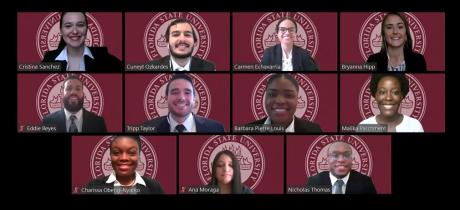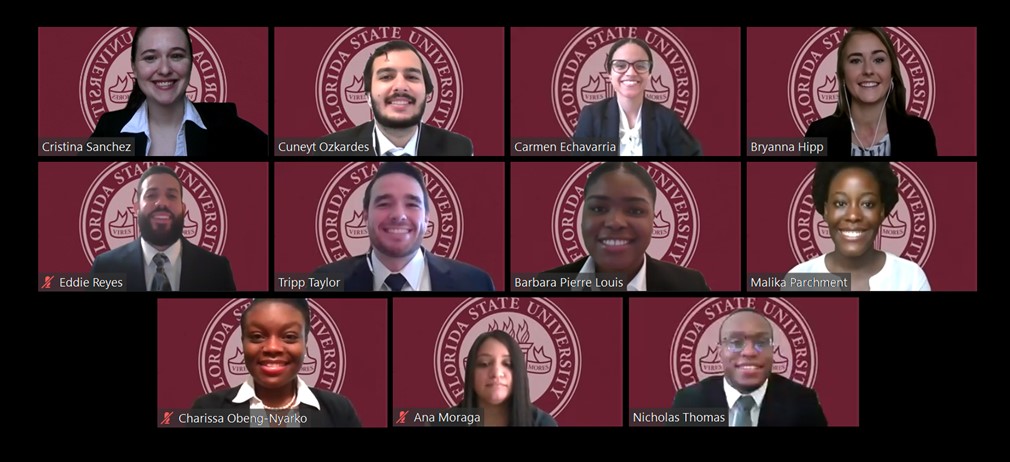Bridge Program celebrates Class of 2020 at annual luncheon


May 14, 2020
The 11 students in the Bridge Program’s Class of 2020 took to Zoom on Tuesday morning to present their research findings to deans, department heads, mentors, administrators, faculty and staff for the annual Bridge Graduation Luncheon.
The presentations mark the end to a busy year. It’s the final requirement before the students receive their master’s in biomedical sciences at the College of Medicine’s virtual commencement ceremony on Saturday. They’ll then join the M.D. Class of 2024 in less than two weeks, on May 26.
“I wish I could be there with you in person, this is usually one of my more favorite events to attend,” College of Medicine Dean John P. Fogarty said in his address to the Bridge class. “I’d like to thank all the staff, faculty and research mentors that did an amazing job during a very trying year. The quality of your presentations and what you did with them, and the quality of the mentorship you received along the way, I couldn’t be more proud.”
The Bridge to Clinical Medicine Program provides a bridge into medical school for promising, hand-picked students – those whose characteristics make them good candidates for practicing primary care with underserved or minority patients in rural or inner-city communities. Often the students come from such communities themselves, and part of the Bridge requirement is to conduct a research project with a medically underserved population.
“You help us truly live our mission,” added Fogarty. “You’re coming from underrepresented, underserved and rural areas and we’re so proud of you and the types of things you’re doing. Most of your studies, as I tend to say every year, were community-based. They’re really focusing on things that are happening in the community and trying to make a difference in those communities.”
The students conducted their research during their three semesters in Bridge under the guidance of mentors from the College of Medicine faculty, FSU College of Nursing, FSU College of Human Sciences and FSU Center on Better Health and Life for Underserved Populations.
As the students wrapped up their presentations, Associate Dean for Student Affairs Rob Campbell reminded the class of the Bridge Program’s legacy.
“You’re joining a very elite group at the College of Medicine. When you look at the history of what Bridge students have done, usually they go into the first year [of medical school] and become leaders of the class,” said Campbell. “Part of what I’m going to ask you to do – especially now with COVID-19 and the distancing that we’re dealing with – is to be there for the other students and to be somebody who’s had the experience, someone they can turn to, and someone who can guide them and ground them. It’s going to be a difficult time for you, but it’s also going to be a difficult time for them … I encourage you to continue that leadership legacy.”
A full list of projects for the Bridge Class of 2020 appears below.
- Carmen Echavarria, “Healthcare Providers and Patient Social Support: A Cross-sectional Survey Analysis” (Faculty mentor: Sabrina Dickey, Ph.D., MSN, College of Nursing).
- Bryanna Hipp, “E-Cigarette Advertising Effect on Harm Perception and Likelihood to Use E-Cigarettes Among U.S. Adolescents” (Faculty mentor: Karen Geletko, MPH, Department of Family Medicine and Rural Health).
- Ana Moraga, “Minority Stress Processes, Social Support and Health Outcomes in LGBTQ College Students” (Faculty mentor: Mary Gerend, Ph.D., Department of Behavioral Sciences and Social Medicine).
- Charissa Obeng-Nyarko, “Stress Outcomes of African American Women in a Church-based Intervention” (Faculty mentor: Penny Ralston, Ph.D., College of Human Sciences and FSU Center on Better Health and Life for Underserved Populations).
- Cuneyt Ozkardes, “Physician Compensation Effects on Preventive Service Delivery” (Faculty mentor: Jeffrey Harman, Ph.D., Department of Behavioral Sciences and Social Medicine).
- Malika Parchment, “Role of Occupational Complexity on Cognitive Health in Blacks and/or African Americans” (Faculty mentor: Joe Gryzwacz, Ph.D., College of Human Sciences).
- Barbara Pierre Louis, “Social Factors and Health Care Use in African American Men” (Faculty mentor: Penny Ralston, Ph.D., College of Human Sciences and FSU Center on Better Health and Life for Underserved Populations).
- Eduardo Reyes Bruno, “The Association between Subjective Sleep and Episodic Memory in Middle-Aged and Older Adults” (Faculty mentor: Angelina Sutin, Ph.D., Department of Behavioral Sciences and Social Medicine).
- Cristina Sanchez, “Race and Intimate Partner Violence Towards Women Before and During Pregnancy” (Faculty mentor: Shermeeka Hogans-Mathews, M.D., Department of Family Medicine and Rural Health).
- Tripp Taylor, “Characteristics of Successful Promotora Health Educators” (Faculty mentor: Joe Gryzwacz, Ph.D., College of Human Sciences).
- Nicholas Thomas, “Work-Family Enrichment: A Buffer of Inflammation among African American Adults” (Faculty mentor: Joe Gryzwacz, Ph.D., College of Human Sciences).

